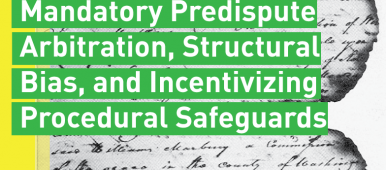
- Mediation
- Arbitration
- Court Neutrals
- Online Dispute Resolution
- Technology
- Court Decisions
- More
- Legislation
- Healthcare
- Guest Posts
- John DeGroote
- John C. Fleming
- Rick Freeman
- Professor Peter Friedman
- Honorable W. Royal Furgeson, Jr.
- James M. Gaitis
- Laura A. Kaster
- Professor John Lande
- Philip J. Loree, Jr.
- Michael McIlwrath
- F. Peter Phillips
- Professor Alan Scott Rau
- Professor Thomas J. Stipanowich
- Professor S.I. Strong
- Richard Webb
- Glen M. Wilkerson
- International arbitration
- Regulation
- Sports and Entertainment
- We’re Back!!!!Well, it’s been a while since we published and that is about to change. Since I spent much of last year becoming
 JAMS Welcomes Karl Bayer to its Panel of NeutralsJAMS, the world’s largest private alternative dispute resolution (ADR) provider, is pleased to announce that Karl Bayer
JAMS Welcomes Karl Bayer to its Panel of NeutralsJAMS, the world’s largest private alternative dispute resolution (ADR) provider, is pleased to announce that Karl Bayer Class Action Waivers in Arbitration Agreements: The Twenty-First Century Arbitration Battleground and Implications for the EU CountriesLinda S. Mullenix, Morris & Rita Atlas Chair in Advocacy at the University of Texas School of Law, has written “Class Ac
Class Action Waivers in Arbitration Agreements: The Twenty-First Century Arbitration Battleground and Implications for the EU CountriesLinda S. Mullenix, Morris & Rita Atlas Chair in Advocacy at the University of Texas School of Law, has written “Class Ac Picking the Proper Technological Tool for Problem-Solving in ArbitrationProfessor Amy J. Schmitz, John Deaver Drinko-Baker & Hostetler Chair in Law and Co-Director of the Translational Data An
Picking the Proper Technological Tool for Problem-Solving in ArbitrationProfessor Amy J. Schmitz, John Deaver Drinko-Baker & Hostetler Chair in Law and Co-Director of the Translational Data An
Recent Posts
Oral Argument Transcripts Now Available for Amex v. Italian Colors Restaurant
Last week, the United States Supreme Court heard oral arguments in American Express Corp. v. Italian Colors Restaurant, et al. (No. 12-133). The appeal from the Second Circuit addresses whether an arbitration clause that prohibits class action lawsuits is enforceable under the Federal Arbitration Act despite that it would compel arbitration of federal antitrust claims. It is the third time in three years the Supreme Court has considered the scope of a class action waiver in an arbitration agreement. Transcripts from the oral argument are now available to read or listen to from the Oyez Project at IIT Chicago-Kent College of Law. Please stay tuned to Disputing for more about this case in the future!
Continue reading...Landmark Survey Reveals Trends in Evolution of ADR
Disputing is pleased to announce a seven part series exploring the findings of Thomas Stipanowich and Ryan Lamare in their notably significant research paper, “Living with ADR: Evolving Perceptions and Use of Mediation. Arbitration and Conflict Management in Fortune 1,000 Companies.“ Following the format of Stipanowich and Lamare’s paper, Part One will background the history of ADR and it’s emergence as an alternative to litigation over the last thirty years. Check out the abstract on Disputing’s previous post on this paper. Stay tuned for Part One!
Continue reading...Mandatory Predispute Consumer Arbitration, Structural Bias, and Incentivizing Procedural Safeguards
Pennsylvania State University’s William Trickett Faculty Scholar and Professor of Law Nancy Welsh has published a thoughtful paper entitled Mandatory Predispute Consumer Arbitration, Structural Bias, and Incentivizing Procedural Safeguards, 42 Southwestern University Law Review 187, 2012; Penn State Legal Series Research Paper No. 1-2013. In her paper, Professor Welsh discusses the increasing use of mandatory consumer arbitration clauses that include class waivers. Here is the abstract: Within the past several decades, there has been an explosion in the creation, institutionalization and use of “alternative” dispute resolution procedures. Mandatory predispute arbitration has generated the most controversy because it appears beset with structural bias. The recent cases of AT&T Mobility LLC v. Concepcion and Compucredit Corp. v. Greenwood have raised additional concerns as the Supreme Court has announced that corporations can force consumers to arbitrate their private and statutory claims and give up their rights to pursue class relief. This Article begins by arguing that the Supreme Court’s enthusiastic embrace of mandatory predispute arbitration should be understood primarily as institutional self-help, as an opportunistic search for the funding and personnel that courts need to conduct fact-finding and decision-making in cases that the courts perceive as routine. By permitting corporations to impose class waivers on consumers, the Supreme Court is incentivizing the corporations to provide and fund a national private small claims court. If the Court is incentivizing in this way, however, this Article urges that it should demand more in return for class waiver. Specifically, it should demand evidence that the arbitration procedure is sufficiently attractive to consumers so that they will pursue their claims, as well as evidence that the procedure is sufficiently fair. One difficulty in making these demands, however, is that courts are obligated to use very limited grounds and a deferential standard of review for arbitral awards. Second, therefore, this Article urges courts to mine past experience in other legal contexts that involve privatized judicial functions, a deferential standard of judicial review, and the incentivizing of procedural safeguards. For guidance, this Article examines MetLife v. Glenn and the evolution of the deferential standards of review that courts apply to ERISA plan benefit denials by private claims administrators, particularly when such administrators operate in a conflicted decision-making context. In this context, the Supreme Court has managed to acknowledge the existence of structural bias and make it a relevant and important factor to be considered as part of deferential judicial review. Further, the Supreme Court has provided guidance to lower courts regarding the weight to be given to structural bias and has provided examples of the information required to assess such weight. Structural bias has been given the stature of tiebreaker in close cases. Finally and most important for the purposes of this Article, the Supreme Court has also incentivized the provision of structural and procedural safeguards (as well as discovery into the existence and operation of such safeguards) in order to reduce the potency of the structural incentives that encourage biased decision-making. In other words, the Supreme Court has incentivized the provision of safeguards that will enhance the likelihood of accurate decision-making—all while maintaining a deferential standard of review. Glenn and its progeny thus offer procedural safeguards that the Supreme Court could — and should — import into its arbitration jurisprudence. These, at the very least, are the sorts of safeguards that the valuable bargaining chip of class waiver should be able to buy. This and other scholarly papers authored by Professor Welsh are available for download (free of charge) from the Social Sciences Research Network.
Continue reading...Fort Worth Appeals Court Holds Insurance Company is Estopped from Forcing Arbitration
In an interlocutory appeal, Texas’ 2nd District Appeals Court has affirmed a trial court’s order denying arbitration. In New Hampshire Insurance Co. v. Magellan Reinsurance Company Ltd., No. 02-12-00196-CV (Tex.App.–Fort Worth, 2013), New Hampshire Insurance and Magellan Reinsurance Company entered into a reinsurance agreement where a trust account was set up to perfect payment. As part of the reinsurance agreement, the two companies agreed to arbitrate all disputes related to the interpretation of the agreement in New York. According to Magellan, New Hampshire allegedly withdrew more than $2 million from the trust account. New Hampshire also reportedly informed Magellan that an additional $1.2 million was due pursuant to the parties’ agreement. Magellan responded by stating New Hampshire made several accounting errors and requested reimbursement of nearly $1 million. Instead, New Hampshire demanded an additional $1.4 million from Magellan. When Magellan refused payment, New Hampshire filed litigation to wind up Magellan’s allegedly insolvent business in the Turks and Caicos Islands (“TCI”) where Magellan is chartered. Magellan filed a motion to stay judicial proceedings and compel arbitration pursuant to the reinsurance agreement. New Hampshire argued against arbitration by stating the dispute was not related to the interpretation of the parties’ agreement. The TCI trial court agreed with New Hampshire and ordered that Magellan be wound up due to insolvency. On appeal, the lower court’s order was reversed and the case was remanded. Before the lower TCI court issued its initial ruling, Magellan began proceedings to stay the TCI litigation and compel arbitration in New York. New Hampshire again argued the parties’ dispute was not subject to arbitration because it was not related to the interpretation of their agreement. After the TCI trial court refused to compel arbitration, the New York court agreed with New Hampshire. While the TCI litigation was still pending, Magellan filed judicial proceedings seeking declaratory relief in Tarrant County, Texas, where the company’s principal place of business is located. New Hampshire then filed a motion to dismiss or abate the Texas action and the Texas court abated the proceedings pending the outcome of the TCI litigation. Finally, a TCI court held that New Hampshire was not a creditor of Magellan and could not wind up the company’s business. Two years later, the Texas trial court vacated its order abating the case. Approximately ten years after the parties’ initial dispute arose, New Hampshire filed a motion to compel arbitration in the Texas court. Magellan responded by arguing that “judicial estoppel, judicial admission, collateral estoppel, and waiver barred New Hampshire” from compelling the case to arbitration. In addition, Magellan completely amended the company’s claims against New Hampshire. Instead of seeking declaratory relief, Magellan accused New Hampshire of breach of contract, fraud, conversion, and several other allegations. The trial court refused to compel the dispute to arbitration and New Hampshire then filed an interlocutory appeal with the 2nd Court of Appeals. On appeal, New Hampshire argued that the company’s past claims against arbitration were irrelevant because they addressed Magellan’s previous request for declaratory relief. According to New Hampshire, the company should be allowed to compel arbitration because Magellan’s new claims were separate and distinct from those previously filed. Magellan responded by stating none of its claims against New Hampshire were related to the interpretation of the parties’ agreement. In addition, Magellan argued that New Hampshire was estopped from compelling arbitration regarding any of Magellan’s claims due to the company’s prior conduct in three separate judicial venues. After holding that Magellan’s breach of contract claims were within the scope of the parties’ agreement to arbitrate, the Fort Worth Court stated New Hampshire was judicially estopped from compelling the dispute to arbitration. According to the court, The foregoing portions of the record thus show that, regarding the scope of the TCI and New York litigation as it pertained to the propriety of compelling arbitration, New Hampshire, to its benefit, maintained a position in the TCI lower court and the New York proceeding that was inconsistent with its position in the Texas action. Now, a number of years later, New Hampshire is attempting to accomplish a similar feat; it successfully argued against arbitration of Magellan’s claims in the TCI litigation and the New York proceeding but now wants to compel arbitration. The unfair advantage that New Hampshire stands to gain simply consists of the fruits of shifting position to suit the exigencies of each particular cause. See Ferguson, 295 S.W.3d at 643; Moore, 629 S.W.2d at 829. This is the precise conduct that judicial estoppel is meant to prohibit. In addition, the 2nd District Appeals Court dismissed New Hampshire’s argument that Magellan’s amended claims were distinct from the previous claims and thus subject to arbitration by stating, According to New Hampshire, “Magellan identifies no case law or other authority . . . holding that an alleged waiver or estoppel of a party’s right to arbitration applies to a later-amended complaint alleging entirely new causes of action.” This is a compelling argument, but it is ultimately unpersuasive because it relies upon a hypertechnical perspective of the proceedings that is inconsistent with the reality of what this dispute has always been, and continues to be, about—both parties’ rights and duties and compliance or noncompliance with one or more terms of the Reinsurance Agreement. The court continued, A thorough review of the record thus reveals this: Neither New Hampshire’s varying characterizations of the proceedings nor the labels attached to the claims alleged by Magellan in its petitions define the essence of the dispute between New Hampshire and Magellan. The dispute has always centered around, and continues to entail, each party’s rights and duties and compliance or noncompliance under the Reinsurance Agreement. On more than one occasion, in one form or another, New Hampshire has argued against the arbitrability of this dispute. Its conduct has been overwhelmingly inconsistent with its present attempt to compel arbitration. Accordingly, in light of all the foregoing, we cannot agree with New Hampshire’s overriding argument that it has never challenged the arbitrability of the […]
Continue reading...Arbitration
The following is part 2 of a 5 part overview of Professors Thomas Stipanowich (Pepperdine University School of Law) and J. Though attitudes may have changed since the 1997 Fortune 1,000 corporate counsel survey, systems seem to have remained ingrained in business culture which has prevented an overall acceptance of ADR processes.
Continue reading...Mediation
Healthcare Disputes
Legal Research
About Disputing
Disputing is published by Karl Bayer, a dispute resolution expert based in Austin, Texas. Articles published on Disputing aim to provide original insight and commentary around issues related to arbitration, mediation and the alternative dispute resolution industry.
To learn more about Karl and his team, or to schedule a mediation or arbitration with Karl’s live scheduling calendar, visit www.karlbayer.com.













